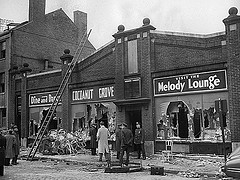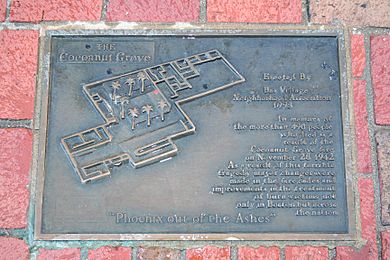Cocoanut Grove fire facts for kids

The Shawmut Street side of the Cocoanut Grove nightclub after the fire
|
|
| Lua error in Module:Location_map at line 420: attempt to index field 'wikibase' (a nil value). | |
| Date | November 28, 1942 |
|---|---|
| Time | Around 10:15 pm |
| Location | Bay Village, Boston, Massachusetts, U.S. |
| Coordinates | 42°21′0″N 71°4′6″W / 42.35000°N 71.06833°W |
| Cause | Ignition of decorative cloth |
| Deaths | 492 |
| Non-fatal injuries | 130 |
| Suspects | Barney Welansky |
| Charges | Manslaughter, numerous building code and safety violations |
| Verdict | Guilty |
| Convictions | Manslaughter |
The Cocoanut Grove fire was a terrible nightclub fire that happened in Boston, Massachusetts, USA. It occurred on November 28, 1942. This fire is known as the deadliest nightclub fire in American history. It tragically took the lives of 492 people. It is also the second-deadliest fire ever to happen in a single building in the U.S.
The Cocoanut Grove was a very popular place in Boston. Many famous people visited it. The owner was Barnet "Barney" Welansky. He had connections to powerful people. Sadly, many safety rules were not followed at the club. Some exit doors were locked. This was to stop people from getting in without paying. Also, the decorations, like fake palm trees, could easily catch fire. The air conditioning system used a gas that was also flammable. This was because of shortages during World War II.
What Happened?
The fire happened during the first Thanksgiving weekend after the U.S. joined World War II. The club was extremely crowded. It had more than twice the number of people allowed by law. The fire started because of an electrical problem. It quickly spread because of the flammable gas in the air conditioning. Flames and smoke filled the club very fast. Many people could not escape. This was partly because some exit doors were locked.
Barney Welansky was held responsible for not following safety rules. His actions led to serious consequences.
Helping the Victims
Local hospitals were ready to help. They had been practicing emergency drills. These drills were for possible attacks on the East Coast during the war. This preparation helped them treat many injured people. The crisis showed how important new blood banks were. It also led to big improvements in how doctors treated people with burns.
New Safety Rules
After this sad event, many new laws were made for public places. These laws were put in place to keep people safe. For example, it became illegal to use decorations that could easily catch fire. Emergency exits must always be unlocked from the inside. Also, revolving doors cannot be the only way to leave a building.
Memorials
In 1993, a special plaque was placed in the sidewalk. It is near where the club used to be. The Bay Village Neighborhood Association put it there. Anthony P. Marra, who was the youngest survivor of the fire, made the plaque.
The plaque says:
In memory of the more than 490 people who died in the Cocoanut Grove fire on November 28, 1942. As a result of that terrible tragedy, major changes were made in the fire codes, and improvements in the treatment of burn victims, not only in Boston but across the nation. "Phoenix out of the Ashes"
In 2013, a short street was renamed Cocoanut Grove Lane. This street runs through the area where the club once stood. The plaque has been moved a few times, which has caused some discussion. A group has now formed to build a larger, more lasting memorial.
The Cocoanut Grove fire was the second-deadliest single-building fire in American history. Only the 1903 Iroquois Theatre fire in Chicago had more deaths, with 602. This fire happened just two years after the Rhythm Club fire, which killed 209 people.
See also
 In Spanish: Incendio del Cocoanut Grove para niños
In Spanish: Incendio del Cocoanut Grove para niños
 | Kyle Baker |
 | Joseph Yoakum |
 | Laura Wheeler Waring |
 | Henry Ossawa Tanner |


